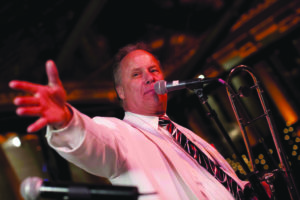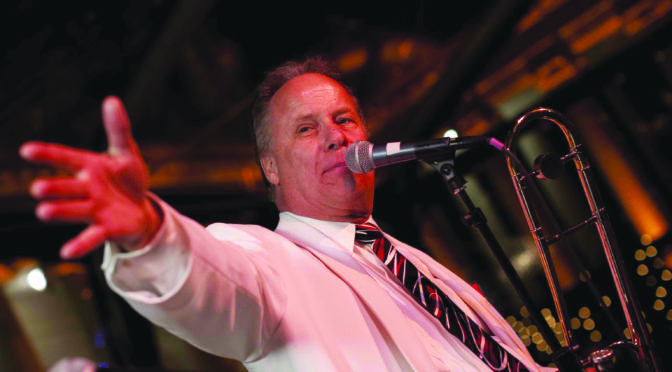
Trombonist Rex Allen of Local 6 (San Francisco, CA) has been a big band leader for 50 years and has cultivated a following in the genre of vintage jazz.
Rex Allen came of age at the height of rock and roll, but he pursued more unconventional music as a teenager in the 1960s—the sound of swing. He took a serious interest in Dixieland jazz, popular from the 1920s through the 1940s. In 1968, he joined the union with an eye on a professional career as a trombone player and bandleader. After 50 years of making music and 44 years with Local 6 (San Francisco, CA), he recently became a Lifetime member.
Allen had the best introduction to the big band era. His parents owned a vast collection of Louis Armstrong, Duke Ellington, and Benny Goodman albums. He became a member of the New Orleans Jazz Club of Northern California and the Sacramento Traditional Jazz Society.
A trombonist and vibraphonist, Allen counts among his influences legends Jack Teagarden and Lionel Hampton, the latter with whom he worked at the 1986 Monterey Jazz Festival. “I played the trombone, of course—I wasn’t going to play vibes with Lionel Hampton,” he laughs. Allen’s brass skills are well known. In a 1985 reader’s poll in Jazzology, he tied with Bill Watrous.
In 1972, he was making a name for himself when he got a call from Jimmy Diamond, bandleader in the New Orleans Room at the Fairmont Hotel. “I was young and still learning,” he says, but it turned out to be an important connection. Allen absorbed swing techniques from top-level players who would later make up his big band and Swing Express, among them Dave Black and Jim Rothermel of Local 6.
He’s been associated with legendary bands, The World’s Greatest JazzBand of Yank Lawson and Bob Haggart, and from 1979 to 1987, he worked with Bob Crosby’s Bobcats, saying, “It was a dream come true, working with my idols!”
In 1977, Allen became co-leader of The Rex Allen/Bob Neighbor Big Band and from 1976-1977, he was featured solo trombonist for the estate-sponsored Tommy Dorsey Orchestra.
When a move to Los Angeles didn’t pan out, Allen returned to San Francisco and has made his home in nearby San Rafael ever since. He formed the all-star quintet Rex Allen Swing Express in the 1980s and led the Gene Krupa Orchestra tribute band for six years. The Rex Allen Big Band made three national tours for Columbia Artists, including the Big Band Salute to Glenn Miller, in 1993.
According to Allen, there were three waves of big band music created by the music industry to satisfy the nostalgia market. The first, in 1968, he says was a direct result of the book, The Big Bands, by jazz writer George T. Simon, a well-known chronicler of the swing era. Allen says, “It reached an audience that listened to big bands in their youth, but in the late 1940s and 1950s they were too busy raising families to buy records or tickets. Years later, they wanted to return to the music they grew up with.” Harry Connick Jr., ushered in a second wave, from 1989 into the 1990s. The last wave, in the 2000s, was less about music interpretation and more about the visual elements of jazz—artists staging an atmosphere for their shows—what Allen calls “costume jazz.”
Allen has worked alternately as a trombonist and vibist in all-star bands for jazz festivals and events around the country. Working steadily earned him a union pension which, he says, “You don’t necessarily consider early in your career—I didn’t pay attention—but it’s made a huge difference now.”
As a bandleader, Allen says, “You are emcee, musician, and manager. You end up reprogramming your best stuff because it works—the best tunes, the best variation of tempos through a set. It’s a formula you want to break, but often can’t. It’s an artistic dilemma.”
Still, through the years, he’s learned to keep it fresh—with vocal presentation and featuring his players as great soloists, creating new arrangements of old tunes—and swing-style charts on pop tunes—while staying within the idiom, he notes. He recalls Tony Bennett, whom he booked in San Francisco, telling him, “You have to reinvent yourself.” “‘A subtle evolution in packaging’, that’s how he described it. Tony definitely went with the times,” says Allen, adding, “He became an elder statesman.”
A semi-retired Allen sums up his work in big bands: “To promote, preserve, and protect the music of the great swing era.” His new show, America Swings Again, is a two-hour production commemorating the music, personalities, and broadcasts. “Most people who listen to our band know what to expect. Play it the way it was played in 1938.”


